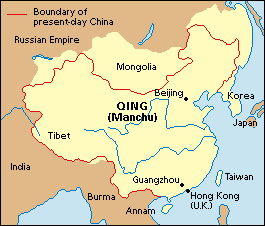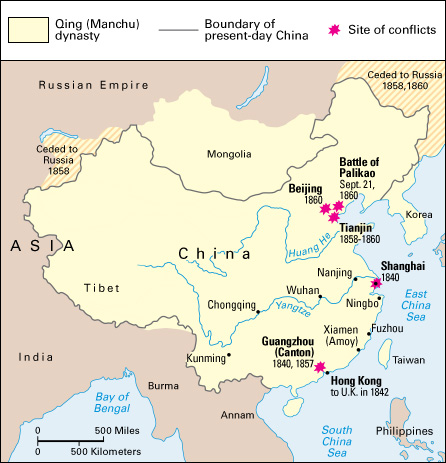Qing << cheeng >> dynasty, was a series of rulers who governed China from A.D. 1644 to 1912. The dynasty was established by the Manchu people and was sometimes called the Manchu dynasty. Many of the Manchus were descended from the Ruzhen (or Jurchen), a tribal people who had earlier ruled northern China. The Qing (meaning Pure) was China’s last dynasty. Revolutionaries overthrew the Qing in 1911. China became a republic the following year.

Beginning of the dynasty.
In 1644, Chinese rebels overthrew the ruling Ming dynasty . Later that year, Manchus from northeastern China seized Beijing , the Ming capital. The Manchus crushed the rebels and established the Qing dynasty.
The Qing expanded their empire to include much of what is present-day China. The territories that came under Qing control included Taiwan , Tibet , and Xinjiang .
Most of China’s population at that time was Han Chinese. Many Han Chinese resented being ruled by Manchus. To ease tensions, Qing leaders employed both Manchus and Han Chinese in government jobs. Many Manchus adopted the philosophy of Confucianism and other Han practices and beliefs.
Weakening control.
During the 1800’s, a series of rebellions and international conflicts weakened Qing control.
In 1839, Chinese officials seized thousands of chests of opium , a powerful drug, from British merchants. The action sparked the Anglo-Chinese Wars (1839-1842 and 1856-1860), sometimes known as the Opium Wars. China lost both wars. Prior to 1842, trade with Western merchants was limited to the port city of Guangzhou . Following the first Anglo-Chinese War, China was forced to open additional trade ports to foreign merchants. In addition, China handed over control of the island of Hong Kong to the United Kingdom. Following the Second Anglo-Chinese War, China agreed to give Russia land north of the Amur River and east of the Ussuri River.

In 1850, a religious group called the Taipings was organizing an army to overthrow the Qing government. The Taipings combined Christian beliefs with ancient Chinese ideas for perfecting society. The armed struggle between the Taipings and the Qing government is known as the Taiping Rebellion. In 1853, the Taipings captured the city of Nanjing (also spelled Nanking) and made it the capital of their movement. The group eventually controlled much of the lower Yangtze River , which served as a main transportation and shipping route. The Qing finally defeated the Taipings in 1864, but the rebellion cost millions of lives and seriously weakened the Qing’s hold on power.
In 1894 and 1895, Japan and China fought over control of the Korean Peninsula. For hundreds of years, Korea had submitted tribute (payment) to China in exchange for military protection and access to Chinese goods. Japan defeated China in the Sino-Japanese War of 1894-1895 . As a result, China lost control of the Korean Peninsula and was forced to recognize Korean independence. In addition, Japan gained control of Taiwan.
Fall of the Manchus.
In the late 1800’s, Chinese rebels formed secret societies to fight the spread of Western influences in China. One of the groups became known as the Boxers. In the Boxer Rebellion of 1900, the Boxers attacked and killed Westerners and Chinese Christians. Following the Boxer Rebellion , the Manchus reformed the Chinese government and economy in an attempt to strengthen their control. However, the reforms failed to save the dynasty.
In 1905, several revolutionary groups that wanted China to become a republic joined together to form the Revolutionary Alliance. The group chose the Western-educated physician Sun Yat-sen as its leader. From 1905 to 1911, the rebels staged a series of armed attacks on the Manchus. On Oct. 10, 1911, army troops associated with the Revolutionary Alliance revolted in the central Chinese city of Wuchang. By the end of 1911, all of China’s southern and central provinces had declared their independence from Manchu rule.
The revolutionary leaders formally established the Republic of China on Jan. 1, 1912. The last Manchu emperor, the 6-year-old Pu Yi , gave up the throne on Feb. 12, 1912.
